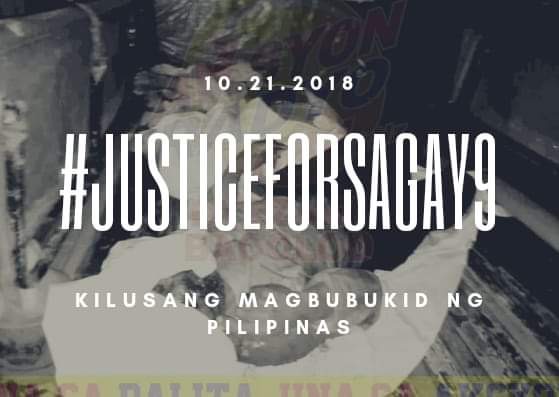On the morning of October 20, 43 members of the local chapter of the National Federation of Sugar Workers in the Philippines (NFSW) in Negros Occidental (a province about 782 kilometers south of Manila), occupied and planted with rice and vegetables 75-hectares of the Hacienda Nene sugar plantation in the province’s Sagay City.
After the day’s hard work, Eglicerio Villegas, Paterno Baron, Rene Laurencio, Angelife Arsenal, Morena Mendoza, Marcelina Dumaguit, Marchtel Sumicad, and Jomarie Ughayon, together with four others, were resting in a makeshift tent when around 40 heavily armed men approached and fired upon them.
The “Sagay 9″ massacre was the eighth massacre under the current Duterte government, according to the Kilusang Magbubukid ng Pilipinas or Peasant Movement of the Philippines (KMP).
This gruesome incident brought the number of farmer victims of extrajudicial killings (EJKs) in the Philippines in the last two and a half years to 172 (data from KMP), 109 of whom were victims of EJKs related to land struggles and conflict, according to PAN Asia Pacific’s (PANAP) Land and Rights Watch. Thirty-three of the 109 were killed this year, making the Philippines the deadliest country in the world for people fighting for their right to land and resources. (See infographic)
October is Peasant Month in the Philippines. Every year, with KMP at the helm, farmers, farm workers, and land rights advocates and activists from all parts of the country would hold a series of nationally-coordinated activities to highlight their plights and their demands from the Philippine government, such as genuine agrarian reform and free land distribution; price controls and production subsidy; and support to farmers affected by calamities, among others.
This year, the farmers aimed to mark the month with a series of bungkalan (land occupation and collective cultivation) in lands long placed under government’s agrarian reform program but remain undistributed and unproductive in different parts of the country. But the Philippine military and police officials discredit the bungkalan as part of “Red October”, a supposed plot to destabilize and bring down the Duterte presidency.
Human and peasant rights advocates blame this government propaganda for supposedly paving the way for the attacks against farmers such as what happened in Sagay. They stress that the bungkalan has been the landless farmers’ way to assert their right to land amid widespread poverty and hunger brought about by landlessness and lack of genuine agrarian reform in the country.
The farmers and farm workers of Negros Island in the central Philippines were eager to participate in the bungkalan. Negros Island is the country’s so-called hacienda capital where sugar estates remain concentrated in the hands of a few wealthy landlords since the Spanish colonial period, and where most of the undistributed land under the 1988 Comprehensive Agrarian Reform Program (CARP) remain. The region is among the poorest, with a substantial portion of its population landless and toiling away in plantations receiving hunger wages.
Latest Philippine Statistics Authority (PSA) report peg poverty incidence in Negros Occidental at 29% of the provincial population, higher than the national average of 21.6 percent. Overall, Filipino farmers are the poorest sector in the Philippines, with a latest poverty incidence of 34.3 percent.
Aside from the Sagay massacre, October has also been marked by trumped-up criminal charges against and arrests of farmers and land activists amid the Duterte government’s “Red October” claims.
Massacre survivors Rene Manlangit and Rogelio Arquillo, for instance, were charged with multiple murder by the Sagay City police for “recruiting” the victims, one week after the massacre.
In southern Philippines, 30 activists, including leaders and members of KMP in the provinces of Misamis Oriental and Bukidnon and its member-organizations, have been issued a warrant of arrest for trumped- up murder charges on October 4. In the list are KMP National Council Member Ereneo Udarbe, KMP-Northern Mindanao Region leader Arturo Colao, and Bukidnon Association of Farmers (BAFA) leader Noli Redondo.
At least 11 have been arrested this month, including Gerry Basahon and Alfredo Abao, whose names were included in the October 4 warrant of arrest and were arrested on October 5 and 15, respectively. Lumad (indigenous peoples of Mindanao) leaders Enecito Catapte, Junie Catapte, and Lito Delicona, known for resisting the encroachment of mining and logging companies in their ancestral domains, were arrested on October 5 in Tandag City, Surigao del Sur province, also in southern Philippines.
In northern Philippines, four women land activists Yolanda Diamsay Ortiz, Eulalia Ladesma, Edzel Emocling, and Rachel Galario, illegally arrested in the province Nueva Ecija and charged with trumped-up charges of illegal possession of firearms and explosives on October 13. They were tortured and forced to confess as supposedly being members of an rebel armed group by the police during their arrest and detention. ###








Discussion about this post